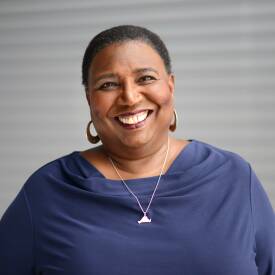The Genius Next Door: Artist Tony Cokes uses mixed-media videos to re-contextualize history
In the last installment of our annual series, "The Genius Next Door," Tony Cokes talks about his artistic process, what inspires him and more.
More from Under the Radar
-
'I'm the mother, that's why': Reflecting on the quirkiness and wisdom of motherhood
This Mother's Day, Under the Radar speaks with two authors who have curated dozens of mother quotes — and written extensively about — motherhood. -
70 years after Brown v. Board of Education, work remains to integrate schools
The landmark Supreme Court decision ended the "separate but equal" doctrine in American schools in 1954. We analyze Brown v. Board of Education's legacy in Boston and nationwide. -
'One Last Word' finds the comedy in what happens when you tell someone how you really feel
Author Suzanne Park's new rom-com is a novel centered around a Korean tech entrepreneur — and what happens when her new app accidentally sends intimate messages to all the important people in her life. -
A new group wants Mass. to be 'the first state to end hunger, permanently'
The Make Hunger History Coalition is made up of anti-hunger advocates, organizations and policymakers, and their ultimate goal is to eliminate hunger in the Bay State.
Under the Radar podcast
-
The Genius Next Door: Media artist Tony Cokes recontextualizes history through mixed-media video installations
Tony Cokes, a professor of modern culture and media at Brown University, is transforming the moving image to shine new light on some of history’s darkest moments. By using text, music, found footage, journalistic writing and more, Cokes recontextualizes traumatic moments in American history and creates video-based artwork. He is one of three local MacArthur “Genius” grant awardees, and the final installment of our annual series, “The Genius Next Door.” -
Environmental experts: Massive changes at the EPA will roll back much-needed scientific research
Within his first 100 days, President Donald Trump and his administration have made major changes when it comes to environmental and climate-related policy and action. What will come of the significant shake-up of the Environmental Protection Agency? Plus, previously off-limits fishing grounds are open for business, wildfires as an East Coast problem and the relevancy of Earth Day – it’s our environmental news roundtable! -
Black Catholics create connection between ancient Christian practice and today’s Black culture
Of the 50 million Catholics in America, only about 3 million are African American. The history of Black Catholics in the United States spans from colonization and enslavement to Black parishes founded by the church during the Jim Crow era. And throughout that history, Black Catholic communities have found ways to make the oldest form of Christianity their own. In honor of Easter, we examine Black Catholicism in Boston and beyond. -
Unbound Pages: Will Massachusetts be the next state to pass 'freedom to read' legislation?
Book bans have been on the rise across the country in recent years prompting lawmakers to pass legislation to protect libraries and librarians. “Freedom to read” legislation has been adopted in four states, aiming to safeguard access to diverse materials in public and school libraries, and some lawmakers are hoping to make Massachusetts the fifth state on that list. This is the latest installment of Unbound Pages, our year-long series on the anti-book-banning movement in America. -
New children’s book tells the behind-the-scenes story of the first presidential Passover Seder
Each year, thousands of Greater Bostonians observe Passover through Seder, the ceremonial meal of prayers, blessings and wine retelling the story of the Jews' exodus from ancient Egypt. It’s a tradition passed down from generation to generation all over the world, but it didn’t reach the White House until 2009. Author Richard Michelson wrote about this unique seder in his new children’s picture book, “Next Year in the White House: Barack Obama’s First Presidential Seder.”










